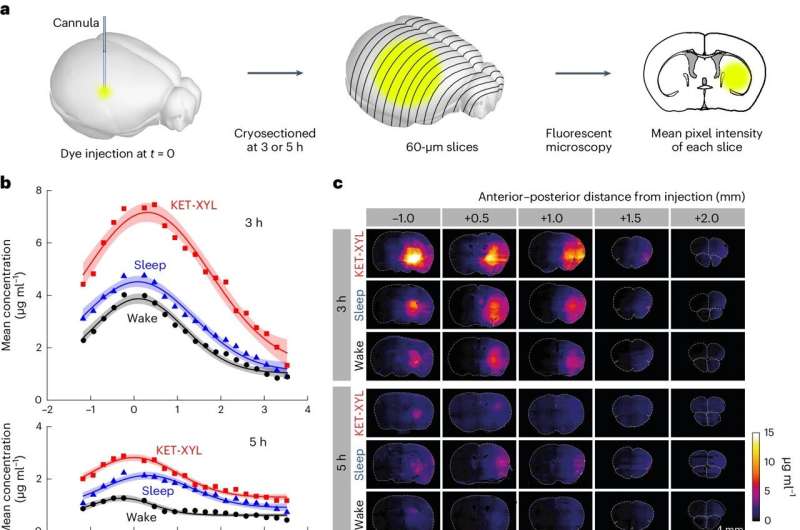
Histology data confirm that brain clearance is reduced by sleep and anesthesia. a, At either 3 or 5 h following injection of AF488 into the CPu, the brain was frozen and cryosectioned at 60 μm. The average fluorescent intensity across each slice was obtained by fluorescent microscopy; then the mean intensities across groups of four slices were averaged. b, The mean fluorescence intensity was converted to a concentration plotted against the anterior–posterior distance from the point of injection for wake (black), sleep (blue) and KET-XYL (red) anesthesia. Top, the data after 3 h. Bottom, the data after 5 h. c, Representative images of the brain slices across the brain (anterior–posterior distance from the site of AF488 injection) at both 3 h (top three rows) and 5 h (bottom three rows). Credit: Nature Neuroscience (2024). DOI: 10.1038/s41593-024-01638-y
The brain’s ability to rid itself of toxins may actually be reduced during sleep, contrary to the leading scientific theory.
Over the past decade, the leading explanation for why we sleep has been that it provides the brain with an opportunity to flush out toxins. However, a new study led by scientists at the UK Dementia Research Institute (UK DRI) at Imperial College London indicates that this may not be true.
By measuring toxin clearance and movement of fluid in the brains of mice, they showed that it was markedly reduced during sleep and under anesthesia.
The researchers used a fluorescent dye, seeing how quickly the dye moved from one area of the brain to another, and was cleared from the brain. This enabled them to measure the rate of clearance of the dye from the brain directly. They found that the clearance of the dye was reduced by about 30% in sleeping mice, and 50% in mice that were under anesthetic, compared with mice that were kept awake.
Prior to this, the leading theory was that sleep improves the clearance of toxins from the brain, which happens via the glymphatic system (a mechanism that flushes waste from the central nervous system). However, this has never been conclusively confirmed and previous studies relied on indirect means of measuring the flow of fluid through the brain.
According to the researchers, the latest findings are surprising and more work is now needed to understand exactly what’s happening, and why. Their work is published in the journal Nature Neuroscience.
Professor Nick Franks, Professor of Biophysics and Anesthetics at Imperial College London, and co-lead of the study, said, “The field has been so focused on the clearance idea as one of the key reasons why we sleep, that we were very surprised to observe the opposite in our results. We found that the rate of clearance of dye from the brain was significantly reduced in animals that were asleep, or under anesthetic.
“As yet, we do not know what it is about these states that slows down the removal of molecules from the brain. The next step in our research will be to try to understand why this occurs.”
The size of molecules may affect how quickly they move through the brain, and some compounds are cleared through different systems. Therefore, the extent to which the findings are generalizable is not yet confirmed.
Professor Bill Wisden, Interim Center Director of the UK Dementia Research Institute at Imperial, and study co-lead explained, “Although we have shown that clearing toxins may not be a key reason why we sleep, it cannot be disputed that sleep is important.
“Disrupted sleep is a common symptom experienced by people living with dementia, however we still do not know if this is a consequence or a driving factor in the disease progression. It may well be that having good sleep does help to reduce dementia risk for reasons other than clearing toxins.
“The other side to our study is that we have shown that brain clearance is highly efficient during the waking state. In general, being awake, active and exercising may more efficiently clean the brain of toxins.”
Next, the researchers aim to uncover how sleep reduces the clearance of toxins from the brain in mice, and to explore whether their findings are applicable to humans.
More information:
Andawei Miao et al, Brain clearance is reduced during sleep and anesthesia, Nature Neuroscience (2024). DOI: 10.1038/s41593-024-01638-y
Citation:
Scientists find sleep may not clear brain toxins (2024, May 13)
retrieved 13 May 2024
from https://medicalxpress.com/news/2024-05-scientists-brain-toxins.html
This document is subject to copyright. Apart from any fair dealing for the purpose of private study or research, no
part may be reproduced without the written permission. The content is provided for information purposes only.
>>> Read full article>>>
Copyright for syndicated content belongs to the linked Source : Medical Xpress – https://medicalxpress.com/news/2024-05-scientists-brain-toxins.html










